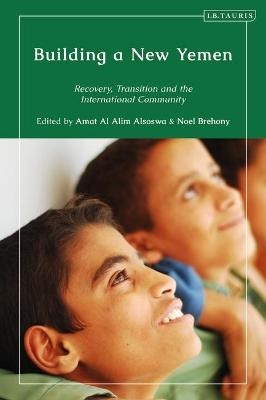
Building a New Yemen
I.B. Tauris (Verlag)
978-0-7556-4026-3 (ISBN)
In this book, Yemeni and international experts assess what political arrangements are required to overcome fragmentation and discord in Yemen. They look to understand how people from all parts of the county can work together to build a new Yemen, one that will give a voice to its young population and provide a full role for women. The contributors argue that Yemen’s major resource is its population, but that Yemenis need to be motivated and trained to give them the skills to rebuild the economy and to prepare for long-term challenges such as water shortages and climate change. The volume also discusses how the international community will need to absorb the lessons of the past to find better ways of creating the institutions, mechanisms and transparency with Yemenis that will enable the flow of vital assistance to where it is most needed.
The book provides an up-to-date analysis to help governments and international agencies who will have to work with Yemen and its neighbours in the post conflict situation.
Noel Brehony CMG is Honorary Vice President and former Chair of the British Yemeni Society. A former diplomat, he has been working on Yemen for many years authoring Yemen Divided (I.B. Tauris, 2011) and editing Hadhramaut and its Diaspora (I.B Tauris, 2017) and co-editing with Saud al-Sarhan, Rebuilding Yemen (2015). Amat Alsoswa was Yemen’s first minister for human rights and the first female cabinet member in the country’s history. She served previously as Yemen's ambassador to Sweden, Denmark and the Netherlands. More recently, she has consulted with the World Bank, particularly in areas such as peacebuilding, gender equality and human rights.
Introduction, Amat Alsoswa, Arabian Peninsula Advisory Board, Washington D.C, USA ; and Noel Brehony, British-Yemeni Society, UK
Chapter 1: The future structure of the Yemen State, Stephen Day, Rollins College in Winter Park, USA
Chapter 2: Yemen and the International Community: fragmented approaches, Laurent Bonnefoy, Sciences Po, France
Chapter 3: Sectarianism and tribalism in the Yemeni war. Hussein Al-Waday, Independent researcher, Yemen; and Maysaa Shujaadeen, Sana'a Center for Strategic Studies, Yemen
Chapter 4: Their fate is tied to ours: assessing AQAP governance and implications for security in Yemen, Joana Cook, Leiden University, Netherlands
Chapter 5: Women in the New Yemen. Sabria Al-Thawr, University of Sanaa, Yemen; and Bilkis Zabara, University of Sanaa, Yemen
Chapter 6: A Parasitic Political Economy . Charles Schmitz, Towson University, USA
Chapter 7: Post-Conflict Economic Recovery and Development in Yemen, Rafat al-Akhali, University of Oxford, UK
Chapter 8: The Role of the International Community and the GCC Countries in the Economic Development of Yemen, Amat Alsoswa, USA
Chapter 9: The future of Yemeni agriculture and water. Helen Lackner, SOAS University of London, UK
Chapter 10: Maximising Regional Incentives for Long-term Peace and Stability in Yemen. James Firebrace, JFA Consulting, UK; and Alia Eshaq,Mashora Group, UK
| Erscheinungsdatum | 13.09.2021 |
|---|---|
| Sprache | englisch |
| Maße | 156 x 234 mm |
| Gewicht | 518 g |
| Themenwelt | Sozialwissenschaften ► Politik / Verwaltung ► Europäische / Internationale Politik |
| Sozialwissenschaften ► Politik / Verwaltung ► Politische Theorie | |
| ISBN-10 | 0-7556-4026-8 / 0755640268 |
| ISBN-13 | 978-0-7556-4026-3 / 9780755640263 |
| Zustand | Neuware |
| Informationen gemäß Produktsicherheitsverordnung (GPSR) | |
| Haben Sie eine Frage zum Produkt? |
aus dem Bereich


